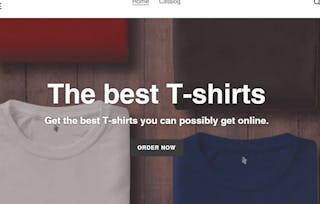Make the Sale: Build, Launch, and Manage E-commerce Stores is the sixth of eight courses in the Google Digital Marketing & E-commerce Certificate. This course explores how businesses and individuals sell products online, including using popular platforms like Shopify. You’ll go through the process of creating a mock e-commerce store. To do this, you’ll build a Shopify store, add the necessary information, and create product listings. You’ll explore how to reach customers online through e-commerce customer outreach methods like advertisements and campaigns.

Make the Sale: Build, Launch, and Manage E-commerce Stores
Seize the savings! Get 40% off 3 months of Coursera Plus and full access to thousands of courses.

Make the Sale: Build, Launch, and Manage E-commerce Stores
This course is part of Google Digital Marketing & E-commerce Professional Certificate

Instructor: Google Career Certificates
224,863 already enrolled
Included with
1,989 reviews
What you'll learn
Understand essential e-commerce strategies and practices
Explain what e-commerce stores and platforms are and how they work
Create an engaging customer experience online using best practices
Set up a mock e-commerce store using Shopify
Skills you'll gain
Tools you'll learn
Details to know

Add to your LinkedIn profile
14 assignments
See how employees at top companies are mastering in-demand skills

Build your Marketing expertise
- Learn new concepts from industry experts
- Gain a foundational understanding of a subject or tool
- Develop job-relevant skills with hands-on projects
- Earn a shareable career certificate from Google

There are 4 modules in this course
You will explore the field of e-commerce and learn about the benefits of selling products online. You’ll study the common terms, tools, roles, and strategies that are used in e-commerce. Then, you’ll learn how to begin an e-commerce project using market research, competitive analysis, target audience identification, product research, product sourcing, and brand strategy.
What's included
13 videos11 readings4 assignments1 plugin
You will learn about different e-commerce stores, including Shopify. You’ll learn about creating, designing, and optimizing an online store to sell products. Then, you’ll build a mock Shopify store and create product listings for it.
What's included
10 videos10 readings2 assignments
You will discover how to reach customers online through methods like advertisement campaigns and examine the benefits of online advertising. Then, you’ll explore how seasonality affects e-commerce businesses. Finally, you’ll learn how to optimize an e-commerce marketing strategy to meet campaign goals.
What's included
9 videos9 readings6 assignments1 plugin
You will learn how to engage with customers online. You’ll explore how the online checkout process works and how to entice customers to purchase a product. You’ll also learn how to move customers efficiently through the flow of a Shopify store. You’ll end the course by learning about the importance of creating a successful path to purchase for customers and how the order fulfillment and shipping process works.
What's included
8 videos9 readings2 assignments2 plugins
Earn a career certificate
Add this credential to your LinkedIn profile, resume, or CV. Share it on social media and in your performance review.
Instructor

Offered by
Explore more from Marketing
 Status: Free Trial
Status: Free Trial Status: Preview
Status: PreviewSimplilearn
Why people choose Coursera for their career

Felipe M.

Jennifer J.

Larry W.

Chaitanya A.
Learner reviews
- 5 stars
85.26%
- 4 stars
12.48%
- 3 stars
1.45%
- 2 stars
0.45%
- 1 star
0.35%
Showing 3 of 1989
Reviewed on Dec 25, 2022
it's a field that always delivers new challenges and offers ample opportunities to learn and grow as a professional. If you like variety and change, marketing is a great career choice!
Reviewed on May 9, 2022
Great opportunity to get hands on experience using the Shopify software. I also liked how Google Ads was explained with the real life examples like ecommerce seasonality.
Reviewed on Feb 13, 2025
I had learnt a lot of new things from creating online e-commerce website through shopify to the importance of smooth checkout process. Thank you .

Open new doors with Coursera Plus
Unlimited access to 10,000+ world-class courses, hands-on projects, and job-ready certificate programs - all included in your subscription
Advance your career with an online degree
Earn a degree from world-class universities - 100% online
Join over 3,400 global companies that choose Coursera for Business
Upskill your employees to excel in the digital economy
Frequently asked questions
Digital marketing is about connecting people and brands online. Digital marketing uses social media, display advertising, email, search engines, and other online channels to attract and engage customers, encourage them to make purchases, and build customer loyalty.
E-commerce refers to the trading of goods and services over the internet. E-commerce uses online platforms to buy and sell products and services, which includes designing an online store, crafting product listings, conducting market research, fulfilling orders, and analyzing store performance.
Digital marketing and e-commerce specialists perform a variety of tasks related to advertising and selling online. Different companies define these roles in various ways, but there is often overlap between them. Some common responsibilities include planning and creating ads and other content for websites, social media, and email; optimizing content for search engines; analyzing data to gain marketing insights; managing online stores; and creating and updating product listings.
During the pandemic, hiring for digital marketing and e-commerce related jobs boomed as more businesses moved online—between February and April 2020, e-commerce grew more than it had in the previous decade. Research shows that there were 40,000+ digital marketing and e-commerce job openings in the past 12 months in the U.S., and the number of available roles is projected to grow in the coming years. The rise of automation, machine learning, and new technologies in e-commerce and digital marketing means candidates will be expected to demonstrate knowledge in the use of digital technologies, which is currently a skills gap that leaves roles unfilled. People can prepare for jobs in these fields through this new entry-level Google Career Certificate.
More questions
Financial aid available,



